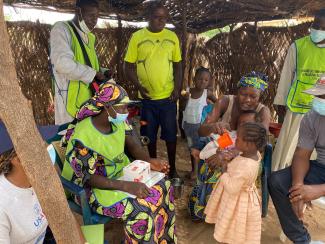Malaria is the most widespread endemic disease in Cameroon, responsible for 2.7 million reported cases, and absenteeism from school and work annually. At the national level, the number of cases recorded in health facilities, stagnant since 2011, has shown an increasing trend since 2017. The number of deaths, after a downward trend over several years, went upward in 2017 and is now showing a small decrease since 2019. In response to this increasing burden, the Government of Cameroon has made the fight against malaria a priority, highlighting the country's Health Sector Strategy and the adoption of the High Burden High Impact (HBHI) stratification exercise in the National Malaria Strategic Plan.
The U.S. President's Malaria Initiative (PMI), led by the U.S. Agency for International Development (USAID) and implemented together with the U.S. Centers for Disease Control and Prevention (CDC), delivers cost-effective, lifesaving malaria interventions alongside catalytic technical and operational assistance to support Cameroon to end malaria. PMI has been a proud partner of Cameroon since 2017, helping to decrease child death rates by 35 percent.
PMI supports investments in the following intervention area and has achieved a number of interventions:
Vector control
Supports longitudinal entomological monitoring (surveillance of same sites over time) in 15 pre-selected sites from seven regions - including monitoring of mosquitoes' insecticide resistance to help determine the kind of insecticide to impregnate bednets with.
Procuredand supported the distribution of 380,000 bednets in two regions in 2020.
Case management
Procures and delivers rapid tests and drugs for prevention and treatment of malaria, and trains facility-based health workers and community health workers (CHWs).
Supports community case management through training and supervision of providers at public and non-profit facilities.
Malaria in pregnancy
Trains and supports the supervision of service providers to pregnant women on malaria case management in pregnancy and provides bednets and malaria drugs.
Provides community health workers with products that help them to instruct pregnant women on early and frequent antenatal care attendance while on home visits.
Seasonal Malaria Chemoprevention (SMC)
In the past three years malaria drugs have been provided to the entire eligible population of children 3-59 months in the North and Far North regions during the high transmission season. Independent monitoring surveys assess the effectiveness of the coverage.
Support for SMC includes both procurement of drugs and all other implementation costs.
Surveillance Monitoring and Evaluation (SM&E)
Established the process and development of tools that standardize and strengthen data collection, validation, and quality assurance, and encourage data use and reporting of malaria data in the national health management information system.
Social Behavior Change (SBC)
Supports the implementation of activities targeted to community members on the consistent use of bednets and proper net care; to health workers adherence to case management guidelines: and to community health workers and community members on early and regular antenatal care attendance.
The interventions above are implemented through the mechanisms below:
U.S. Centers for Disease Control and Prevention Interagency Agreement 1:
Supports technical assistance for building entomological capacity, supporting case management, and monitoring and evaluation of Cameroon’s National Malaria Program.
Life of program: 7 years
Geographic scope: North and Far North
Implementing partner: Center for Disease Control (CDC)
Global Health Supply Chain Procurement and Supply Management Malaria Task Order 2:
Supports commodity procurement and logistics for malaria commodities, and provides technical assistance in supply chain coordination at the central level, quantification and supply planning, warehousing and inventory management at the regional level, logistics management information systems quality improvement at the district level, as well as distribution of malaria commodities.
Life of program: 7 years
Geographic scope: North and Far North
Implementing partner: Chemonics International, Inc.
PMI VectorLink:
Supports vector surveillance, insecticide resistance monitoring, the generation of data to inform the choice of bed nets, and provides technical assistance for distribution of long-lasting insecticide-treated bed nets at antenatal clinics.
Life of program: 5 years
Geographic focus: North and Far North
Implementing partner: Abt. Associates
Breakthrough Action:
Focuses on social and behavior change communications (SBCC) activities for communities, health care professionals, and the National Malaria Control Program (NMCP). Such SBCC activities include those related to care-seeking, demand for routine community malaria services, quality of medical service, and national coordination.
Life of activity: 5 years
Geographic scope: North and Far North
Implementing partner: Johns Hopkins University
PMI Impact Malaria:
Implements seasonal malaria chemoprevention and strengthens the capacity of health service providers to deliver case management services at health facilities and communities.
Life of program: 5 years
Geographic scope: North and Far North
Implementing partner: Population Services International
Malaria Data Integration and Visualization for Eradication (M-DIVE):
Supports PMI’s efforts in data integration, analysis, and use capacity for decision making. By accelerating data utilization and sharing processes across currently siloed data sources, M-DIVE works to shorten the data-to-action cycle.
Life of program: 5 years
Geographic scope: North and Far North
Implementing partner: National Technical Information Service
Malaria Surveillance Monitoring & Evaluation (PMI Measure Malaria):
Supports NMCP and other stakeholders in implementing the District Health Information System, data quality monitoring, supportive supervision, and technical assistance for data use. This program assists the Ministry of Public Health’s Health Information Unit and enables health districts to use high quality data to monitor malaria service provision and epidemiological impacts of interventions.
Life of program: 5 years
Geographic scope: North and Far North
Implementing partner: University of North Carolina at Chapel Hill

Christelle Ngueajio USAID/Cameroon
